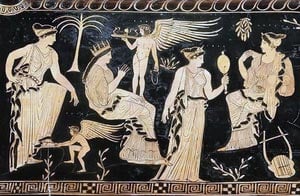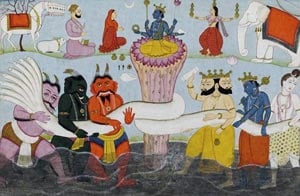
Immortality, the Elixir of Life and the Food of the Gods
When we look into the accounts of many different mythologies and religions, it becomes clear that the gods are either immortal or live a life of many thousands of years. What is rarely mentioned is the fact that in ancient religious texts there is reference to their immortality or longevity being connected to a specific kind of food that only the gods are allowed to eat. The gods were required to eat this food regularly to maintain immortality, power and strength. Many references also refer to the fact that if mortals ate this food, they would also become immortal like the gods. So let us explore the mythology surrounding this ‘Elixir of Life’
One of the main references to the food of the immortals can be found in Greek mythology. It is written in the stories of the Greek gods that ambrosia and nectar was the food and drink of the immortal gods and this first appears in the Greek mythology relating to the birth of Zeus. Before the ‘invention’ or ‘discovery’ of ambrosia and nectar by the gods, it was written that they would feed by ‘sniffing’ the vapours of their dead enemies, as if they would feed from the energy of the dead souls.
 Ambrosia was said to come from the horn of a magical goat named Amalthea, the foster-mother of Zeus. The horns of Amalthea provided a limitless supply of ambrosia but were also capable of producing any kind of food for any kind of living being. White holy doves would carry the ambrosia and a large eagle with shiny wings would fly at an extraordinary speed through the sky where he would get the nectar and then bring it down to the baby Zeus.
Ambrosia was said to come from the horn of a magical goat named Amalthea, the foster-mother of Zeus. The horns of Amalthea provided a limitless supply of ambrosia but were also capable of producing any kind of food for any kind of living being. White holy doves would carry the ambrosia and a large eagle with shiny wings would fly at an extraordinary speed through the sky where he would get the nectar and then bring it down to the baby Zeus.
When demigod Achilles was born, his mother would pour ambrosia over Achilles and he would become immortal, but because she held him around his heel that was the only part that remained mortal. This allowed Achilles to be killed later on by Paris.
It was said that ambrosia was used by the gods to cure diseases, fix scars, and make the body beautiful again. If dead people would be treated with ambrosia, their bodies would remain in perfect condition forever. In other references, we can see that ambrosia was abundant in the gardens of Hesperides. Hesperides were nymphs who tend to a blissful garden in the far western corner of the world, a place where ambrosia was brought to the God Zeus.
But the immortal food also appears in the Bible where we can see similarity between the gardens of Hesperides and the gardens of Eden, where according to the Old Testament, man was forbidden to eat the fruit from the Tree of Life:
And out of the ground the Lord God made to spring up every tree that is pleasant to the sight and good for food. The tree of life was in the midst of the garden, and the tree of the knowledge of good and evil, Genesis 2:9
When Adam and Eve ate from the forbidden Tree of Knowledge, it appears that God alerted other Gods to be on alert because man should not eat also from the Tree of Life and become immortal like them.
Then the Lord God said, “Behold, the man has become like one of us in knowing good and evil. Now, lest he reach out his hand and take also of the tree of life and eat, and live forever, Genesis 3:22
 Moving on to Zoroastrian and Vedic mythologies, we can see reference to a special drink consumed by the gods, known as Soma and Haoma respectively. This special drink was prepared by extracting the juices from the stalks of certain plants, which are unknown to us today. Drinking Soma and Haoma would give immortality. Idra, the leader of the Devas, and the God Agni, are mentioned in the Rig Veda to have been drinking large quantities of the immortal drink.
Moving on to Zoroastrian and Vedic mythologies, we can see reference to a special drink consumed by the gods, known as Soma and Haoma respectively. This special drink was prepared by extracting the juices from the stalks of certain plants, which are unknown to us today. Drinking Soma and Haoma would give immortality. Idra, the leader of the Devas, and the God Agni, are mentioned in the Rig Veda to have been drinking large quantities of the immortal drink.
We have drunk Soma and become immortal; we have attained the light, the Gods discovered, Rig Veda 8.48.3
If we now move to Egyptian mythology and the legends of Thoth and Hermes Trismegistus, we will see that there are references to both of them drinking ‘white drops’, also referred to as ‘liquid gold’, which provided them with immortality. References about this can be found in the Quran (Sura 18; the Khidr) and in one of the Nag Hammadi texts.
In Sumerian texts, we have references to the Ninhursag’s milk, one of the seven great deities of Sumer, the goddess of fertility that is associated with a cow (similar to the magic goat Amalthea of the Greek mythology). The gods and the kings of ancient Sumer would drink from this milk to become strong and immortal. In the Epic of Gilgamesh, we also have reference to a thorny plant at the bottom of the ocean that would make someone immortal and this was kept as a secret of the gods.
In the Hindu religion, the gods would harness a milk called Amrita, a nectar that was collected and drunk by the gods to give them immortality, but forbidden for humans to drink. This milk was apparently surrounding the Earth, and the gods would collect it with the help of a serpent.
In Chinese mythology we have the ‘Peaches of Immortality’ as the food of the immortals. Eating this food ensured the everlasting existence of the gods. If humans would eat from this fruit they would also become immortals.
The search for the Elixir of Life has been the supreme quest for many. In medieval times, there are accounts of the alchemists looking for the philosopher’s stone, believed to be required to create the elixir but also to convert lead to gold. Bernard Trevisan, an alchemist of the 15 th century said that dropping the philosopher’s stone into mercurial water would create the elixir, and we have multiple cases of alchemists that allegedly found the Elixir of Life including the infamous Cagliostro or Saint Germain.
Nectar and Ambrosia, the Tree of Life, Amrita, Peaches of Immortality, Soma and Haoma – are all these references simply the imagination of our ancient ancestors? Or, like other myths, is there an element of truth to be found in these ancient tales? It is possible that immortality or longevity can really be achieved through the consumption of a ‘special’ food, which has always been held as a privilege reserved for the gods? Perhaps the search for the ‘Elixir of Life’ is a valid and one day it may be found…
By John Black
Related Links
















Comments
Wow! Its great information well. I enjoyed reading your post. Get in touch with <a href=”https://www.toppsychictoronto.com”> Best Psychic in Toronto</a> to solve your life related problems
Pandit Shiva Tej is Famous Psychic in Toronto Canada. He is a Psychic in Canada solves all your problems related to career, jobs, marriage, finance and family disputes as well.
The tree of life, and knowledge is cannabis. See Cannabis and the Soma Solution - Chris Bennett.
Mr. Black needs to read Rufus Camphausen on the subject. Many fluids of 'Immortality' refer to sexual fluids and organs of the body. Peaches refers to the breasts of nubile women. "The Encyclopedia of Erotic wisdom".
Hi there,
I noticed that it was mentioned in this article that, in referring to Genesis 3:22, God "alerted other Gods to be on alert" that Adam and Eve had eaten of the Tree of the Knowledge of Good and Evil, and could now become all-knowing as they were.
As a Christian, I would like to gently clarify that this is not what that verse means. In the Christian faith we believe in the Trinity: God the Father, God the Son, and God the Holy Spirit; one supreme being with three different forms. However, still one and only one God. (To make this concept easier to grasp, think of it like water. Water is always H2O molecules, but it can take on three different forms: solid, liquid, or gas. Nevertheless, it's still H2O no matter what form it is in.)
That being said, in the context of this verse (and also in Gensis 1:26), the most logical conclusion for God referring to himself in the plural is that He is referring to himself in the context that he is all three Father, Son and Holy Spirit. The God of the Bible is a relational God, relational first within himself as we can see in Genesis, at the very beginning of time. The "us" in this verse is not referring to God and other gods; it is referring to God the Father, God the Son, and God the Holy Spirit. I know this verse can be confusing , and that's why I wanted to clear it up. I hope this helps!
Still there is lot of investment requir to revil mistry about it which may spend century to even get small clue about immortal.
Pages